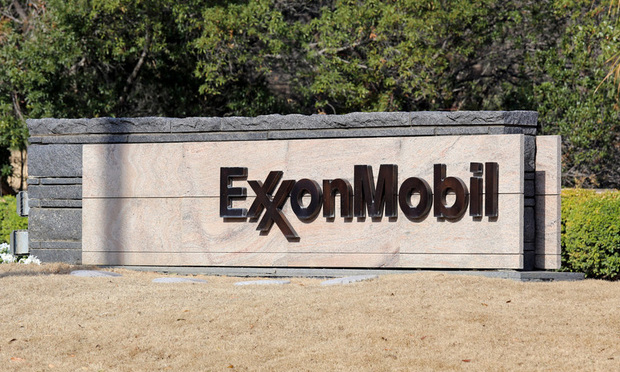Exxon Lawyer Talks Kobe Steel, North Korea and Other Supply Chain Considerations
When it comes to Exxon's massive supply chain, associate GC Robert Johnson said that his company's attorneys are constantly facing new questions.
October 18, 2017 at 02:31 PM
6 minute read
 Lawyers, no matter which industry, are grappling with how to deal with legal ethics and compliance issues in their supply chains.
Lawyers, no matter which industry, are grappling with how to deal with legal ethics and compliance issues in their supply chains.
In-house attorneys with international corporations, including Exxon Mobil Corp., addressed this dilemma head-on during the Association of Corporate Counsel's annual meeting in Washington D.C., Tuesday.
Robert Johnson, associate GC at Exxon, said his company's 430 attorneys worldwide are constantly confronted with new questions when it comes to areas within its massive supply chain. Just this past week, for instance, the company had to check whether it used any Kobe Steel products. Kobe came under fire this month after admitting to falsifying certification for copper, aluminum and steel products that were sold to as many as 500 companies.
It turns out Exxon was one of them.
Johnson and his colleagues found themselves asking questions like: “Did we buy some of that? Yes we did. Where did we put it? Various facilities in various places,” he recalled. “And so now we're running around and investigating. We've got to find out: 'Where's that steel; is it a problem?' Of course the lawyers will look at the contracts and decide whether we have to make claims.”
Another example that impacted Exxon's supply chain is the recent executive order imposing sanctions on relationships with North Korea. Johnson explained that “you can't use a ship that has been on the North Korea port in the past six months.”
“One of the things we're wrestling with at Exxon Mobil right now is, do we need to do due diligence to find out if these ships have been there? Or is it enough for us to put in our contracts, 'Hey maritime company, you need to make sure we don't have any of these ships in our supply chain.' Is that enough? Not sure,” Johnson said.
Johnson admits that, while Exxon's concerns are countless, they face less of a risk with things like child labor, which has historically plagued industries such as apparel retail, he said.
He advised companies to continue to examine their existing population of suppliers and distributors. “There are a lot of technology tools out there to use,” he said. “You can do that at a reasonable cost.”
One emerging area where he thinks companies will need to pay more attention is with cybersecurity.
At Exxon, he said, for any companies hosting the company's data or with “any kind of access to the network,” there is an external service provider agreement in place. Exxon's cybersecurity team reviews that company's cybersecurity practices extensively, Johnson said.
Exxon's team is asking: “Do they have good practices? Do they have good firewalls? Are we comfortable with it?”
“That's an emerging due diligence area that I think all of us will be doing more of,” Johnson said. “The fun never ends in the supply chain.”
 Lawyers, no matter which industry, are grappling with how to deal with legal ethics and compliance issues in their supply chains.
Lawyers, no matter which industry, are grappling with how to deal with legal ethics and compliance issues in their supply chains.
In-house attorneys with international corporations, including
It turns out Exxon was one of them.
Johnson and his colleagues found themselves asking questions like: “Did we buy some of that? Yes we did. Where did we put it? Various facilities in various places,” he recalled. “And so now we're running around and investigating. We've got to find out: 'Where's that steel; is it a problem?' Of course the lawyers will look at the contracts and decide whether we have to make claims.”
Another example that impacted Exxon's supply chain is the recent executive order imposing sanctions on relationships with North Korea. Johnson explained that “you can't use a ship that has been on the North Korea port in the past six months.”
“One of the things we're wrestling with at
Johnson admits that, while Exxon's concerns are countless, they face less of a risk with things like child labor, which has historically plagued industries such as apparel retail, he said.
He advised companies to continue to examine their existing population of suppliers and distributors. “There are a lot of technology tools out there to use,” he said. “You can do that at a reasonable cost.”
One emerging area where he thinks companies will need to pay more attention is with cybersecurity.
At Exxon, he said, for any companies hosting the company's data or with “any kind of access to the network,” there is an external service provider agreement in place. Exxon's cybersecurity team reviews that company's cybersecurity practices extensively, Johnson said.
Exxon's team is asking: “Do they have good practices? Do they have good firewalls? Are we comfortable with it?”
“That's an emerging due diligence area that I think all of us will be doing more of,” Johnson said. “The fun never ends in the supply chain.”
This content has been archived. It is available through our partners, LexisNexis® and Bloomberg Law.
To view this content, please continue to their sites.
Not a Lexis Subscriber?
Subscribe Now
Not a Bloomberg Law Subscriber?
Subscribe Now
NOT FOR REPRINT
© 2025 ALM Global, LLC, All Rights Reserved. Request academic re-use from www.copyright.com. All other uses, submit a request to [email protected]. For more information visit Asset & Logo Licensing.
You Might Like
View All
Fired by Trump, EEOC's First Blind GC Lands at Nonprofit Targeting Abuses of Power
3 minute read
Trump Fires EEOC Commissioners, Kneecapping Democrat-Controlled Civil Rights Agency


The New Trump Worksite Enforcement Paradigm: Everything You Need to Know
14 minute readTrending Stories
Who Got The Work
J. Brugh Lower of Gibbons has entered an appearance for industrial equipment supplier Devco Corporation in a pending trademark infringement lawsuit. The suit, accusing the defendant of selling knock-off Graco products, was filed Dec. 18 in New Jersey District Court by Rivkin Radler on behalf of Graco Inc. and Graco Minnesota. The case, assigned to U.S. District Judge Zahid N. Quraishi, is 3:24-cv-11294, Graco Inc. et al v. Devco Corporation.
Who Got The Work
Rebecca Maller-Stein and Kent A. Yalowitz of Arnold & Porter Kaye Scholer have entered their appearances for Hanaco Venture Capital and its executives, Lior Prosor and David Frankel, in a pending securities lawsuit. The action, filed on Dec. 24 in New York Southern District Court by Zell, Aron & Co. on behalf of Goldeneye Advisors, accuses the defendants of negligently and fraudulently managing the plaintiff's $1 million investment. The case, assigned to U.S. District Judge Vernon S. Broderick, is 1:24-cv-09918, Goldeneye Advisors, LLC v. Hanaco Venture Capital, Ltd. et al.
Who Got The Work
Attorneys from A&O Shearman has stepped in as defense counsel for Toronto-Dominion Bank and other defendants in a pending securities class action. The suit, filed Dec. 11 in New York Southern District Court by Bleichmar Fonti & Auld, accuses the defendants of concealing the bank's 'pervasive' deficiencies in regards to its compliance with the Bank Secrecy Act and the quality of its anti-money laundering controls. The case, assigned to U.S. District Judge Arun Subramanian, is 1:24-cv-09445, Gonzalez v. The Toronto-Dominion Bank et al.
Who Got The Work
Crown Castle International, a Pennsylvania company providing shared communications infrastructure, has turned to Luke D. Wolf of Gordon Rees Scully Mansukhani to fend off a pending breach-of-contract lawsuit. The court action, filed Nov. 25 in Michigan Eastern District Court by Hooper Hathaway PC on behalf of The Town Residences LLC, accuses Crown Castle of failing to transfer approximately $30,000 in utility payments from T-Mobile in breach of a roof-top lease and assignment agreement. The case, assigned to U.S. District Judge Susan K. Declercq, is 2:24-cv-13131, The Town Residences LLC v. T-Mobile US, Inc. et al.
Who Got The Work
Wilfred P. Coronato and Daniel M. Schwartz of McCarter & English have stepped in as defense counsel to Electrolux Home Products Inc. in a pending product liability lawsuit. The court action, filed Nov. 26 in New York Eastern District Court by Poulos Lopiccolo PC and Nagel Rice LLP on behalf of David Stern, alleges that the defendant's refrigerators’ drawers and shelving repeatedly break and fall apart within months after purchase. The case, assigned to U.S. District Judge Joan M. Azrack, is 2:24-cv-08204, Stern v. Electrolux Home Products, Inc.
Featured Firms
Law Offices of Gary Martin Hays & Associates, P.C.
(470) 294-1674
Law Offices of Mark E. Salomone
(857) 444-6468
Smith & Hassler
(713) 739-1250






